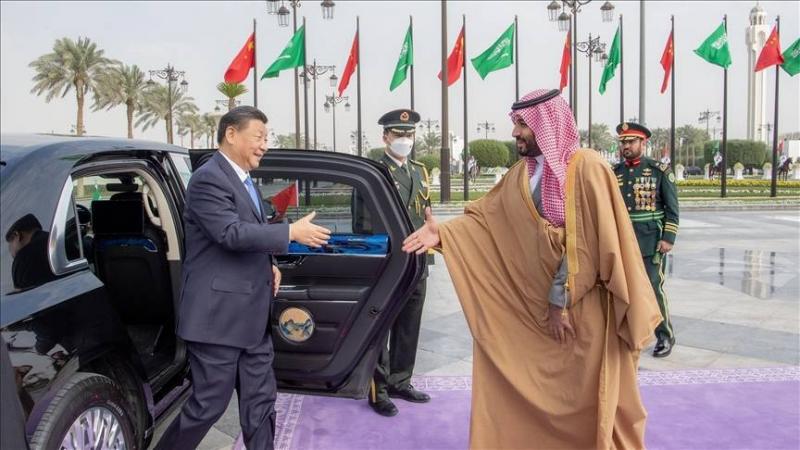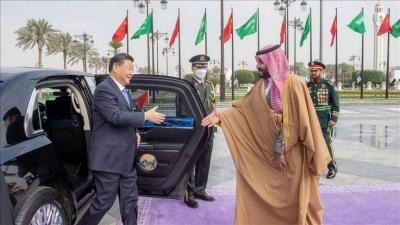The constructive launch within the Arab Gulf states is remarkable, as visionary and youthful leadership anticipates the future with the courage to dream, plan, and reform, and is determined to forge a partnership of prosperity and happiness with its citizens.
Over the past two weeks, impactful images of reconciliation stirred a sense of proud exhilaration, bringing tears of joy on more than one occasion. A truly beautiful event unfolded in Doha, not only due to the grandeur of the FIFA World Cup preparations but also by witnessing the leaders of Saudi Arabia and the UAE warmly hosted by Qatari leadership, with pride and determination to move forward with this necessary leap.
An impressive announcement came from Saudi Arabia, stating that the 2023 budget would show financial surpluses of approximately $4.2 billion, with Crown Prince Mohammed bin Salman affirming a historic decline in unemployment. These are the fruits of reforms harvested by the economy, the people, and Saudi women, whose economic participation rose from 17.7% to 35.5%. Congratulations to a people awakening to such news amidst significant preparations to welcome Chinese President Xi Jinping to the pragmatically strategic Riyadh summits.
The Arab Gulf states are not only building themselves but also strengthening the Arab region within the framework of international political stature. Saudi Arabia's capital hosted two important summits for the first time: Gulf-China and Arab-China, highlighting Saudi Arabia's notable doctrine that partnership is the secret to successful leadership. The fact is, the state truly qualified to lead Arab and regional affairs is Saudi Arabia.
The Riyadh summits launched the future. They ensured the export of oil to the Chinese market and the import of technology, alongside partnerships in massive projects that will link China with Gulf countries and, eventually, the Arab region when the Eastern countries emerge from their failed systems and join the Gulf journey. There is no room for investment or reconstruction in troubled countries inhabited by corruption, where rulers neglect their people. Therefore, congratulations to the peoples of monarchical systems that care about the happiness of their citizens and the prosperity of their countries, while the republican systems that exploited their peoples as commodities for marketing their lies and satisfying their immense greed are shameful.
What did China desire from this unique moment at the Riyadh summits? The Chinese leadership is confident that the current conditions favor an increase in its influence in the Middle East, considering Russia's weakness and its practical exit from the region, while the United States has lost its initiative in the Middle East.
Beijing expects Russia to face increasing international problems and does not want to depend uncertainly on Russian oil; hence, it seeks reliable and sustainable energy sources. Since the ruling party congress decided to renew its push towards the Belt and Road Initiative, China needs good relations with Gulf and Middle Eastern countries.
This is a complex approach combining China's determination to forge a new path in its relations with these countries—political, economic, and regional. Economic relations will not be limited to the energy sector but will expand into developmental projects, from infrastructure to tourism. Technologically, the cooperation will not be confined to civilian technology but may also include military technology that the United States and Western countries do not permit to export to Arab countries.
Politically and regionally, the Chinese leadership aspires to play the role of a "bridge" between Saudi Arabia and the Islamic Republic of Iran to alleviate tensions. China dislikes tensions in the relationships among its friends. The Chinese leadership believes it can play a distinctive and successful role in the Yemen issue, which would be welcomed by Saudi Arabia and the Gulf. Iran may resist, but China's influence with Tehran is significant.
The comprehensive strategic agreement between China and Iran is expansive and multidimensional, granting China considerable leverage in Iran. First, China's import of large quantities of Iranian oil underpins Tehran's sustainability instead of succumbing to economic collapse due to U.S. sanctions. Therefore, China's purchase of Iranian oil additionally boosts its leverage with Iran. If Beijing uses this leverage to end the Yemen war, it would indeed be a significant investment for Saudi Arabia, which seeks to conclude that conflict.
In the geopolitical landscape and strategic positioning as a major power, the equation has completely shifted with Russia's effective exit from the previous triangle that included the United States, China, and Russia in the context of great power competition. Whether Russia self-sabotaged through its invasion of Ukraine or whether the West and NATO deliberately entangled it to extricate it from the equation, the reality is that the equation is now exclusively binary.
There is no evidence that China views the Gulf and the Middle East as a competition arena between itself and the United States. Likewise, the United States does not oppose the development of Gulf-China relations, as long as they are purely economic and not security alliances. China, in turn, is not seeking to position itself as a security partner in place of the United States, which remains the strategic security partner of Arab Gulf states, and China sees no conflict with the U.S. outside the Taiwan dispute.
Thus, the only security issue facing the Gulf region is Iran. Here, the Arab Gulf states may benefit from their relations with China to temper Iran. This is a qualitative shift, considering that Iran had counted on the troika of China, Russia, and Iran. However, this troika has disintegrated in its Russian and Iranian dimensions and has fundamentally altered with the transformation in Chinese-Arab relations.
Today, China is gradually distancing itself from a weakened Russia, not wanting to tie its fate to Russia's if it faces defeat or further weakening, especially in the oil sector. The world seems to be preparing for a U.S.-Russian two-pole system rather than a three-pole world. This requires both China and the U.S. to deeply consider what global security and stability mean in the new global order. Energy stability in the Gulf is crucial for China's considerations, making its orientation towards Saudi Arabia exceptionally important.
Riyadh understands this, and what matters to it is affirming and stabilizing markets, knowing that China is the largest importer of Saudi oil. The Saudi leadership aims to secure a market capable of absorbing Saudi oil for years, seeks unhindered technology, and desires essential training and partnerships for the kingdom's transition into a new era. China offers all of that. Saudi Arabia is evolving daily with innovations, projects, and investments, developing its coasts, cities, and future tourism, and is keen to reduce reliance solely on oil resources.
The cooperation emerging among the six Gulf Cooperation Council states indicates that these countries have begun establishing a practical and stable base for renewed cooperation among themselves. The presence of Saudi Crown Prince Mohammed bin Salman alongside Qatari Emir Sheikh Tamim bin Hamad Al Thani during the World Cup opening was a beautiful sight, further enriched when Sheikh Tamim celebrated Saudi Arabia's victory by placing the Saudi flag around his neck.
The visit of UAE President Sheikh Mohammed bin Zayed Al Nahyan to Doha was exceedingly significant, as it opened a new chapter after a difficult rupture, suggesting renewed understanding. These are two proud nations making rapid developments from infrastructure to space.
The UAE chose to harness space culture to fulfill its dreams for both men and women, continuously leading efforts to shape the future. Qatar presented the world with innovative and cutting-edge technology during matches viewed by the entire globe, building an impressive infrastructure to provide comfortable hosting far beyond expectations.
The national spirit of all Gulf Cooperation Council states, and indeed all Arab countries, was beautiful, particularly as sports opened doors for diplomacy and reconciliation following previous estrangements.
Kuwait is a country of moderation, where freedom of expression and civil and political rights prevail, and its role on the global stage is to support humanitarian initiatives. Oman has become an important backchannel for global diplomacy, striving to bridge perspectives and overcome obstacles and difficulties to resolve crises with neighboring countries. Bahrain has carved a path for coexistence among religions and sects and recently hosted His Holiness the Pope on a historic visit that highlighted Bahrain's global standing.
The journey of the six Gulf countries remains gradual; some are moving at a pace that is difficult to keep up with, while others are slower. It is crucial that reconciliation continues among the six states after the restoration of relations between Saudi Arabia and Qatar and then between the UAE and Qatar. It is now time to resolve the dilemma between Qatar and Bahrain, and there are ongoing efforts in this direction.
The successful joint mediation in the prisoner exchange process between the U.S. and Russia, achieved by the Saudi crown prince and the Emirati president, underscores the distinctive global role of both nations and their leaderships, reflecting not only the political acumen of Sheikh Mohammed bin Zayed and Prince Mohammed bin Salman but also their ability to build relationships and friendships with countries like the United States and Russia.
The mutual strategic trust discussed by President Xi Jinping in Riyadh is a positive project that should not alarm or disturb Washington, as long as there is seriousness, continuity, and coherence in the broader strategy between the United States and the Arabian Gulf states. However, one must beware of underestimating the word trust and the implications of President Xi's choice of it in the context of strategic relations with the Arab region.




